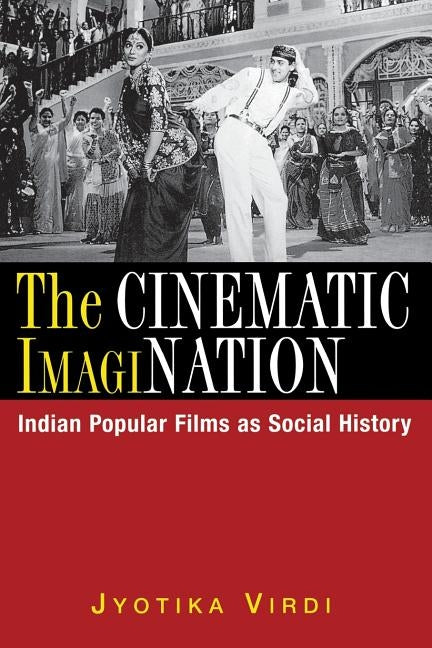1
/
of
1
Rutgers University Press
The Cinematic ImagiNation: Indian Popular Films as Social History
The Cinematic ImagiNation: Indian Popular Films as Social History
Regular price
€33,95 EUR
Regular price
Sale price
€33,95 EUR
Shipping calculated at checkout.
Quantity
Couldn't load pickup availability
"This book makes an important contribution to the field of Asian film criticism, Indian film history, cultural studies, and gender studies. The Cinematic ImagiNation provides readers with valuable insight into the relationships between nation-building, gender, sexuality, the family, and popular cinema, using post-Independence India as a case study."
--Gina Marchetti, author of Romance and the "Yellow Peril" Race, Sex, and Discursive Strategies in Hollywood Fiction India produces more films than any other country in the world, and these works are avidly consumed by non-Western cultures in Africa, Eastern Europe, the Middle East, and by the Indian communities in Australia, Britain, the Caribbean Islands, and North America. Jyotika Virdi focuses on how this dominant medium configures the "nation" in post-Independence Hindi cinema. She scrutinizes approximately thirty films that have appeared since 1950 and demonstrates how concepts of the nation form the center of this cinema's moral universe. As a kind of storytelling, Indian cinema provides a fascinating account of social history and cultural politics, with the family deployed as a symbol of the nation. Virdi demonstrates how the portrayal of the nation as a mythical community in Hindi films collapses under the weight of its own contradictions--irreconcilable differences that encompass gender, sexuality, family, class, and religious communities. Through these film narratives, the author traces transactions among the various constituencies that struggle, accommodate, coexist uneasily, or reconstitute each other over time, and, in the process, reveal the topography of postcolonial culture.
Author: Jyotika Virdi
Publisher: Rutgers University Press
Published: 03/07/2003
Pages: 280
Binding Type: Paperback
Weight: 0.80lbs
Size: 8.90h x 6.00w x 0.60d
ISBN: 9780813531915
--Gina Marchetti, author of Romance and the "Yellow Peril" Race, Sex, and Discursive Strategies in Hollywood Fiction India produces more films than any other country in the world, and these works are avidly consumed by non-Western cultures in Africa, Eastern Europe, the Middle East, and by the Indian communities in Australia, Britain, the Caribbean Islands, and North America. Jyotika Virdi focuses on how this dominant medium configures the "nation" in post-Independence Hindi cinema. She scrutinizes approximately thirty films that have appeared since 1950 and demonstrates how concepts of the nation form the center of this cinema's moral universe. As a kind of storytelling, Indian cinema provides a fascinating account of social history and cultural politics, with the family deployed as a symbol of the nation. Virdi demonstrates how the portrayal of the nation as a mythical community in Hindi films collapses under the weight of its own contradictions--irreconcilable differences that encompass gender, sexuality, family, class, and religious communities. Through these film narratives, the author traces transactions among the various constituencies that struggle, accommodate, coexist uneasily, or reconstitute each other over time, and, in the process, reveal the topography of postcolonial culture.
Author: Jyotika Virdi
Publisher: Rutgers University Press
Published: 03/07/2003
Pages: 280
Binding Type: Paperback
Weight: 0.80lbs
Size: 8.90h x 6.00w x 0.60d
ISBN: 9780813531915
Share


